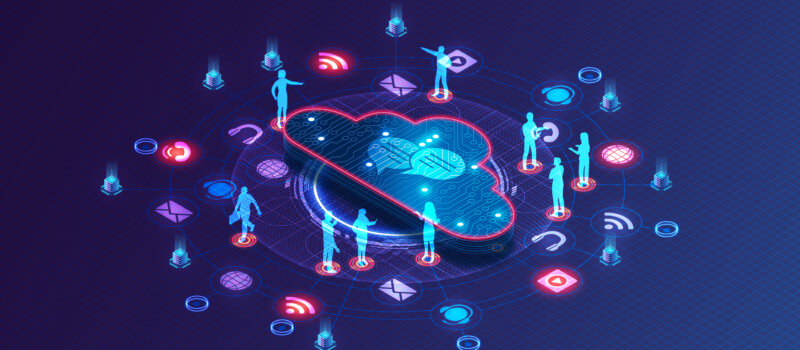Artificial intelligence (AI) is transforming contact center operations, reshaping customer interactions, and enhancing efficiency across industries. As customer expectations rise, contact centers turn to intelligent agents to deliver faster, more personalized support.
These AI-driven tools—ranging from virtual assistants to sophisticated chatbots—are central to optimizing service delivery and enabling human agents to focus on complex issues. By adopting AI and intelligent agents, contact centers build seamless, 24/7 support systems that respond to customer needs more effectively than ever before.
Quick Takeaways
- AI-driven intelligent agents enable 24/7 customer support, ensuring round-the-clock service and reducing response times.
- Intelligent agents enhance personalization, using customer data to create tailored, relevant interactions for improved customer satisfaction.
- Automating routine tasks with AI improves efficiency and lowers costs, freeing human agents to handle more complex inquiries.
- Implementing AI requires secure, well-integrated solutions, ensuring compliance, data privacy, and seamless support for evolving customer needs.
What Are Artificial Intelligence and Intelligent Agents in Contact Centers?
Artificial intelligence in contact centers refers to advanced technology designed to automate, support, and improve customer interactions.
AI tools, such as machine learning algorithms and natural language processing, help contact centers interpret customer requests, predict needs, and adapt to various service scenarios. Intelligent agents—like chatbots, virtual assistants, and AI-driven routing systems—utilize these tools to enhance interactions by offering immediate, relevant responses.
Intelligent agents handle a wide range of tasks. From addressing common inquiries to escalating complex issues to human agents, these tools ensure efficient, high-quality service while reducing workload. By acting as a front line for customer interactions, intelligent agents allow human agents to dedicate time to more nuanced support requests, creating a balanced, efficient support model that increases customer satisfaction.
The Benefits of Intelligent Agents Powered by Artificial Intelligence
Intelligent agents offer significant advantages for contact centers looking to enhance customer service quality and operational efficiency:
24/7 Availability
Intelligent agents make round-the-clock support possible, reducing wait times and ensuring customers can receive assistance at any hour. With over 50% of customers now expecting businesses to be accessible 24/7, AI-driven agents allow contact centers to meet this demand without expanding human resources, building trust and satisfaction by offering prompt service beyond regular business hours.

Enhanced Personalization
By leveraging customer data, AI-driven agents can tailor responses based on prior interactions and preferences. This personalization adds value to each engagement, creating a more positive customer experience.
Increased Efficiency and Cost Savings
Intelligent agents handle repetitive tasks like answering FAQs and routing calls, which enables contact centers to operate efficiently without adding personnel. This reduction in workload translates to cost savings while maintaining a high level of service.
Scalability
As call volumes fluctuate, AI-driven agents can scale up seamlessly, managing demand spikes without impacting service quality. Contact centers thus maintain consistency, even during peak times, with minimal manual intervention.
Security and Compliance
AI agents can adhere to security protocols, ensuring data privacy and regulatory compliance while managing automated tasks. This functionality is essential for contact centers handling sensitive customer information, making AI solutions both reliable and secure.
Practical Applications of AI and Intelligent Agents in Contact Centers
Intelligent agents bring a wide range of capabilities to contact centers, streamlining tasks and enhancing service quality:
- Customer Service Automation: AI-driven chatbots and virtual assistants efficiently handle routine inquiries, direct calls, and provide quick resolutions for frequently asked questions. By taking on these straightforward tasks, intelligent agents free up human agents for complex cases, increasing overall productivity.
- Predictive Insights and Sentiment Recognition: AI can assess customer sentiment during interactions, allowing contact centers to understand and respond to customer emotions in real time. Predictive analytics also enables agents to anticipate customer needs based on historical data, allowing for proactive issue resolution and a more personalized approach to service.
- Agent Assistance Tools: AI-powered tools support human agents by delivering real-time insights, such as customer sentiment analysis and relevant data retrieval during live interactions. These tools allow agents to make informed decisions quickly, resulting in smoother, more satisfying customer experiences.
In recent years, AI’s role has expanded beyond traditional customer support functions, as businesses increasingly use AI to proactively engage customers and improve service quality across all touchpoints. For instance, companies now apply AI not only to respond to customer inquiries, but also to anticipate customer needs before they reach out and to evaluate interactions for continuous improvement.

This comprehensive approach illustrates a shift toward using AI to enhance each stage of the customer journey—from predictive outreach to post-interaction insights. By incorporating these applications, contact centers can streamline operations, enhance agent performance, and create a customer-centric support experience.
Best Practices for Integrating AI into Contact Centers
Integrating AI into contact center operations requires strategic planning to ensure a seamless transition. Here are some best practices for a smooth and effective AI implementation:
- Prepare Infrastructure and Training: Ensure that the existing technology infrastructure can support AI tools. This includes setting up data integration protocols and training agents on how to work alongside intelligent agents. When agents understand the technology, they can maximize its benefits and feel empowered in their roles.
- Prioritize Security and Compliance: Implement AI solutions that adhere to privacy standards and regulatory requirements, especially when handling sensitive customer information. Security-first AI solutions protect both the business and the customers, maintaining trust and compliance across interactions.
- Monitor and Optimize: AI-powered tools require regular evaluation to maintain accuracy and efficiency. Periodically assess performance metrics, identify areas for improvement, and update the AI models as needed. A data-driven approach to optimization ensures that intelligent agents remain effective and up-to-date with customer expectations.
By following these best practices, contact centers can fully realize the benefits of AI and intelligent agents, creating a robust, reliable support framework that enhances both customer and agent satisfaction.
Building a Smarter Contact Center Today with Intermedia
Artificial intelligence and intelligent agents are transforming the way contact centers deliver customer support, offering faster, more personalized experiences. By implementing these AI-driven tools, contact centers can streamline operations, reduce costs, and ensure consistent service quality. As AI technology continues to advance, integrating intelligent agents into customer support will be essential for creating efficient, responsive contact centers that meet modern customer expectations.
Discover how Intermedia’s advanced, integrated solutions can enhance customer experiences, improve efficiency, and keep your contact center agile. Learn more about the tools and technology available to elevate your support strategy, or request a demo today!
November 26, 2024
Explore other posts on these topics: AI Contact Center





